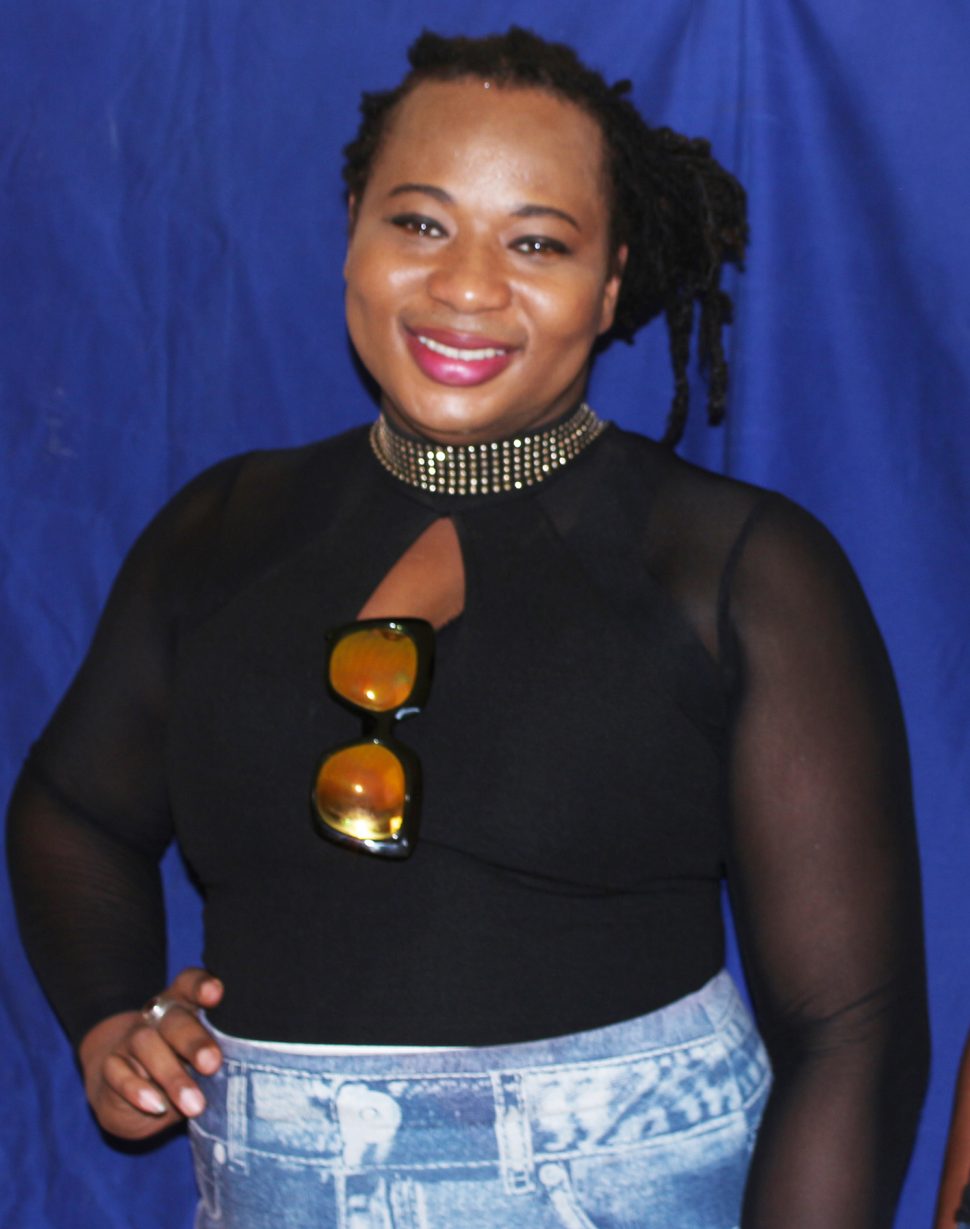(Pheches (Joseph) Fraser is a litigant in the challenge to the cross-dressing law of Guyana. Rae Wiltshire is an award-winning playwright, theatre director and short story writer. His play “Creative Burial Ground” and short story, “Me Fuss Fineral” placed first and second respectively at the Guyana Annual Competition 2018 . He is currently in his final year at the University of Guyana, studying Literature and Linguistics.
For Pheches Carlina, depression is being in Guyana: “Guyana is a very depressing country. It’s a nice and beautiful place but the thinking of the people is bad. Everything is a threat to them. If you’re black, you’re a threat to Indian. If you’re Indian, you’re a threat to black. To make it worse, if you’re gay, lesbian, bisexual or transgender, it is seen as out of the norm.”
Pheches describes herself as a dominant person. This dominance has ensured her survival as a transgender woman living in Guyana. “All my life, I had to fight,” she says, quoting the famous line from the film The Color Purple. It’s a trait that is both nature and nurture. She recounts an uncle saying, “Listen, I don’t business who you are, but when you speak I want you to speak with authority. If you go out on the road, don’t come home and say somebody beat you. If you got to fight to your last breath, you gon’ fight.”
This hyper-masculine upbringing helped her survive transphobic abuse from her primary school teacher, who told her: “You’re a boy, why you behaving like a girl? Boys don’t behave this way.” The teacher made Pheches walk, with her hands on the blackboard, from one end of the classroom to the other. And she would hit parts of Pheches’ body that she felt looked “girly-girly” – usually her hands and the bottom of her feet. The abuse made Pheches ashamed and she cried continuously in school, yet she rebelled against it: “Every day I would go and behave the same way, to make her feel disgust, because she would beat me anyway.”
Pheches also faced discrimination in her church. At 11 years old, she was refused communion. A pastor told her she was “a strange child”, then asked Pheches to get her mother. After the congregation had left, she called the other pastors over and they surrounded Pheches and her mother. The pastor then bluntly asked, “You ever see anybody pun yuh son back?” Pheches never went to church again.
Locked out of life
Discrimination followed Pheches into adulthood and she had a hard time keeping jobs. She recalls a supervisor scolding her in the presence of customers, saying: “Hello, hello. You is a boy, why you think you can come to work like that? Like you supervisor don’t see how you does come to work.” The supervisor complained to Pheches’ supervisor, who did not have a problem with her appearance. Not satisfied with the response, she went to the personnel department of the department store. Pheches was fired. No reason was given.
Child abuse and unemployment are just two of the by-products of discrimination. Discrimination is also responsible for the deaths of many transgender women. Pheches has lost transgender friends because of discrimination in medical treatment. This has deterred many transgender women from seeking treatment, who have died as a result.
Pheches does not believe that she can be happy and fulfill her dreams in Guyana. “You can’t get job, you can’t get rights for yourself, it makes you very depressed because you feel as if you in a jail yard because you can’t walk and go anywhere,” she says. “When I travel to other countries, persons from the LGBT community are treated differently. It makes me want that life, not this life.”
Pheches has dreams of marrying, of owning her own home and transportation, of completing her education. She dropped out of Kingston Community High School and decided to help her mother, who was a single parent. Pheches also hopes to further her career as a make-up artist, model and fashion/interior designer. She first modelled as a woman in a Mashramani band. The band did not have any female participants and a woman suggested Pheches had a “girl face”. In full make-up and couture fashion, she reveled down the road – finally feeling herself.
Making strides
Pheches now uses her creative talents to empower other transgender women by coaching them in pageantry. She is also a trained peer counselor and works at advocacy group Guyana Trans United (GTU), which she helped to form after she was arrested with seven other trans women for cross-dressing. In 2010, four of those arrested – Gulliver (Quincy) McEwan, Angel (Seon) Clarke, Pheches (Joseph) Fraser and Isabella (Seyon) Persaud – with the support of the Society Against Sexual Orientation Discrimination (SASOD), put forward a constitutional claim that the law was inconsistent with the Guyana Constitution (1980).
They argued that the Summary Jurisdiction (Offences) Act – which uses terms such as “improper purpose”, “male attire” and “female attire” – is vague and fails to give “the person of ordinary intelligence a reasonable opportunity to know what is prohibited”, as laws must do. The litigants argued that the Act violated their right to freedom of expression, since clothing is a form of expression, as well as the constitutional guarantee of non-discrimination and equality before the law.
In 2017, SASOD reported that The Court of Appeal had unanimously dismissed the appeal, rejecting the appellants’ arguments that the law in question discriminates based on gender and violates multiple equality provisions in the constitution. On June 28, 2018, they appealed the case again at the Caribbean Court of Justice (CCJ). Pheches hopes that the ruling is in the transgender community’s favour. “I need all of my transgender friends to be able to wear their female clothing, it would be so good for us,” she says. “For so long we’ve been marginalized as a community, by the police, the government, the health sector and we just can’t do anything.”
A long way still to go
GTU has made many strides since it was launched in 2012. The organisation serves as a safe place for transgender people, educating them on their rights, addressing health concerns and providing legal support and counselling. However, Pheches says many issues still plague the transgender community. “Transgender women seek love, but they’ve never been loved and they don’t know what love is,” she explains. “Some transgender women see a man beating them as a fantasy; it makes them feel more like a real woman.”
Domestic violence is an issue that plagues Guyana. It is reported in the media almost daily. Pheches believes that transgender women who come from broken homes are targets for abusive relationships. Another matter she is concerned about is the media’s representation of trans persons. She urges transgender women to be cautious of how they are represented: “Transgender people must control the media. Don’t answer certain questions that the media ask you. They take it and turn the entire thing into a joke.”
The constant discrimination and disrespectful trivialisation of transgender issues can lead to a deterioration in the mental health of transgender women. “There is a lot of substance abuse and persons are thinking of suicide,” says Pheches. “They are thinking; ‘I don’t have money, I don’t have a house and these things plague their minds.” She wants Guyanese to look at transgender people and see what they can contribute to society, not define them solely on their transgender identity.
Pheches herself refuses to live according to an identity constructed by society. “I don’t want to be a girl who you want as a puppet show,” she says. “So if you feel you can call me to drink lil liquor, show de men dem you could wine, I don’t want that. I don’t want to be a part of that.” But she still has to contend with the laughter and finger pointing of transgender persons that has become the norm in Guyana.
The Government of Guyana has made promises to protect LGBT citizens from discrimination, but it is still prevalent in the public and private sector, with no recourse for LGBT persons who are affected. “The government lied to the people, saying that they won’t discriminate, but you can still go into a government workplace and be discriminated against,” says Pheches.
The battle continues for Pheches, but she is grateful to have the support of her mother and two sisters. And she is encouraged when she sees other trans women fighting to exist in Guyana. It gives her the strength to survive.


